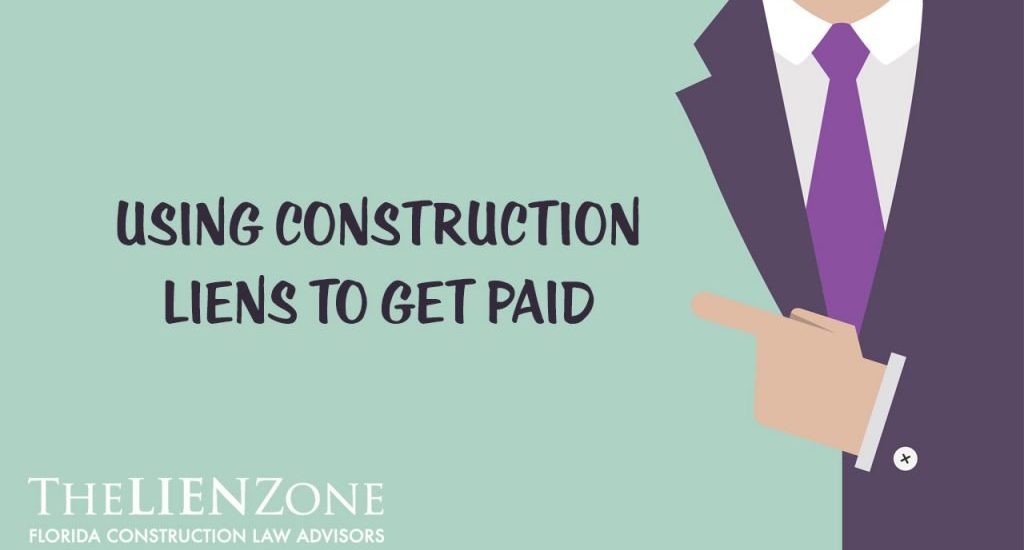- June 15, 2020
- Posted by: admin
- Category: Contractor Legal Information, Florida Contractor License

The following article was written by Miami Construction Lawyer Alex Barthet and appeared first on TheLienZone. It was re-posted with permission. For more information about Alex and his firm, please visit www.TheLienZone.com and www.Barthet.com.
See below for some great information on using construction liens to get paid. Liens can get you paid for your work, but only if properly prepared and timely filed. Keep reading to see if you’re doing it right.
Do not hesitate to call us here at Licenses, Etc.! If we don’t have the information, we can find it for you!
Using construction liens to get paid can be an effective way to protect your work – if you follow the lien rules.
A lien is an encumbrance – a legal hold. This hold is placed on real property for the value of the work and materials you provided but for which you haven’t yet been paid. Someone who owns a piece of property cannot sell or refinance that property without resolving the issues connected to your lien.
There are guidelines and rules for using this construction tool. First, you need to be entitled to lien, generally because, through a written or oral contract, you have performed work on real property. Secondly, you need to fall within the chain of contracts provided by the lien law. The lowest “link” on that chain of potential lien holders is the sub-subcontractor and material supplier to a subcontractor.
Be aware that you cannot lien for:
- Materials not delivered or installed. If you have materials in your warehouse that were ordered but have not been delivered or installed, you cannot include that in your lien.
- Delay damages. If a job takes longer than expected, and you believe you are entitled to additional money, you aren’t allowed to include those amounts in your lien. You can sue for that money, but you cannot lien for it.
- Lost profits. If you were terminated a third of the way through a contract, you could sue for the rest, but you may not include that amount in your lien.
Here are the general rules for being able to benefit from your lien.
- Within 45 days of your first day of work, you need to serve a Notice To Owner.
- Within 90 days of your last work on the job, you need record the Claim of Lien.
- Within 15 days of recording the lien, you must serve a copy of the Claim of Lien to all interested parties listed on the Notice of Commencement, which is recorded by the owner or contractor at beginning of a job.
- If you have a contract with the owner, you should serve a contractor’s final affidavit at least five days prior to filing a lawsuit to foreclose on the lien. You may not file suit until 300 days after recording the lien, but it’s recommended you serve the contractor’s final affidavit at the same time you record the lien. (Again, this is only in the case of having a direct contract with the owner).
- Within one year of recording, file suit to foreclose on the lien. This is the only way to preserve your lien rights.
In our experience, if you are unable in your own collection process to get paid, you should move swiftly to use a lien. You need not wait the entire year.
Several lien rules have specific exceptions. For example, if you are in direct contract with the owner, there’s no need to send a Notice To Owner. However, you should. An owner who receives formal notice will take you more seriously when being reminded that you could eventually sell his home if you aren’t paid. Sub-subcontractors and material suppliers need to get a Notice to Owner to the contractor, as well as owner. Otherwise, the contractor has no way to know they are on the job.
Planning ahead is truly important. Sending a Notice to Owner within 45 days means that notice has to be received by that 45th day. If you drop it in the mail on day 44, it’s too late. Using a notice-to-owner company for your filings can be extremely helpful in staying on top of calendar deadlines. Remember that 90 days is not three months. Some months do not have 30 days, so calculate carefully, including all weekends and legal holidays, all the way to the end date. If the 90th day falls on a weekend or holiday, it rolls to next day.
Also, warranty and punch list work is not last work. Last work should be something meaningful under your contract, not a touch-up, repainting or patching. Passing inspection is also not considered last work.
Working on leased property means you may not have lien rights on the property itself, but only as to the lease agreement. If you foreclose on that lien, you might find yourself with the lease. But if the leasee isn’t paying you, he may not be paying the landlord. As a result, the lease may soon be void, if not already in default.
Using construction liens is not possible for all projects or circumstances. Know the possibilities before deciding to take a job. If a lien is the avenue you must travel, follow the legal requirements closely and timely to protect the work and supplies you have provided.
At Licenses, Etc., we offer a fast and easy contractor license application process for our contractor clients in Florida and other states. We are a Florida contractor licensing company. Contact us at Licenses, Etc., to get your Florida contractor’s license today by clicking Florida contractor’s license page or calling 239-777-1028.
Leave a Reply
You must be logged in to post a comment.
